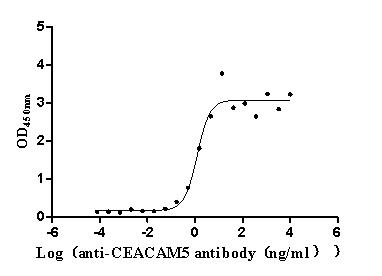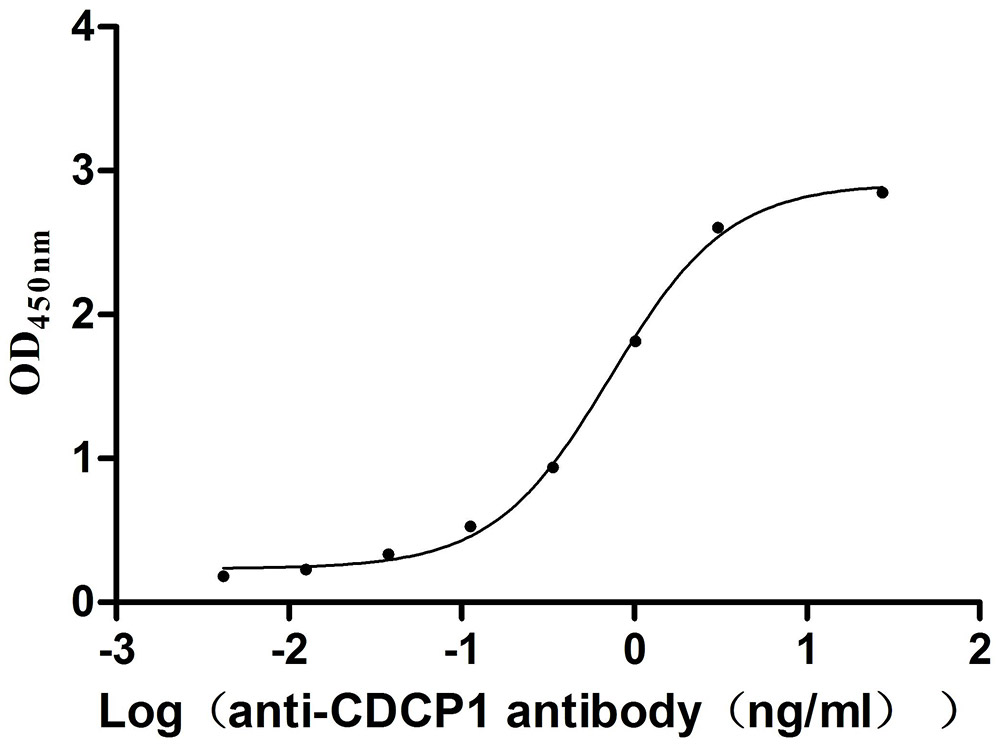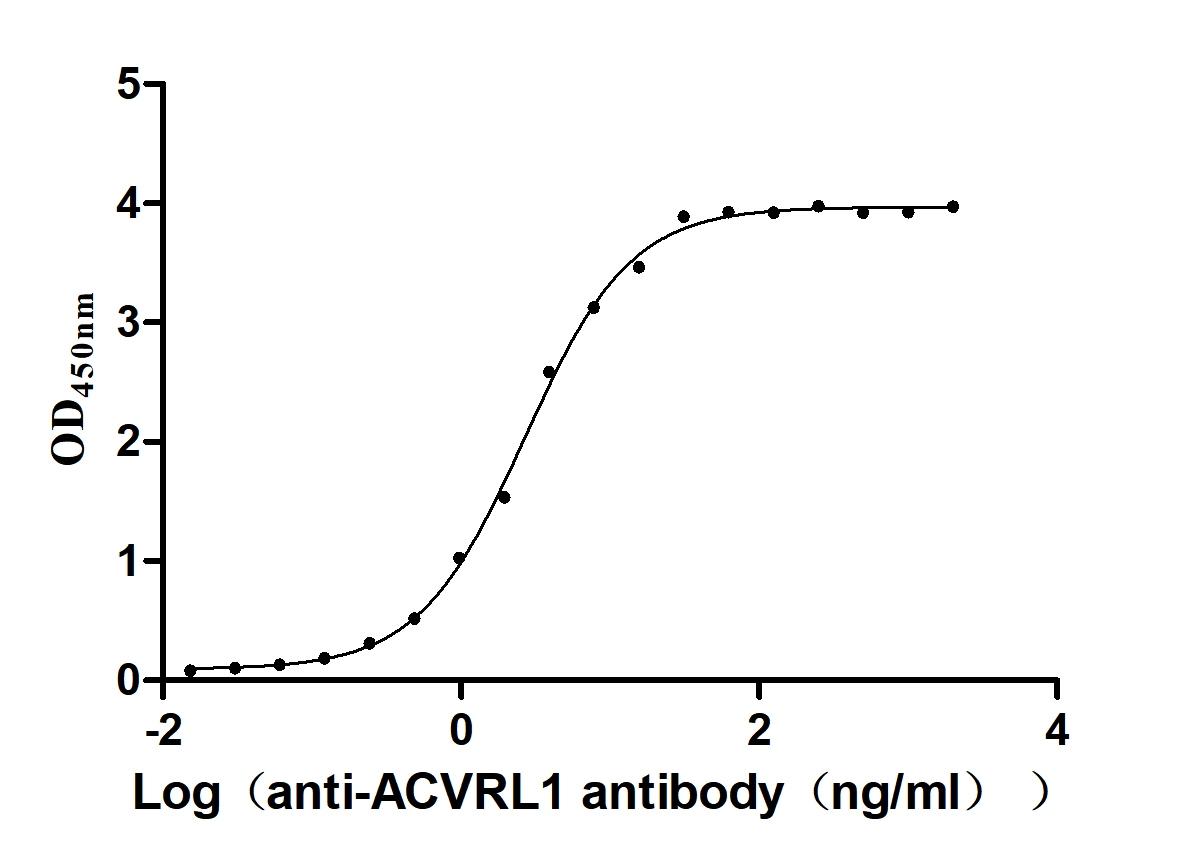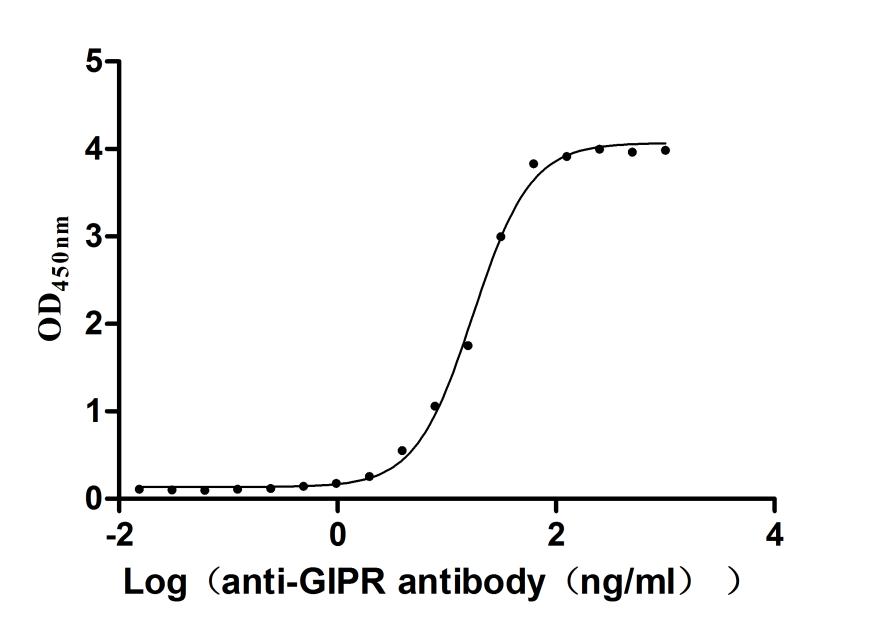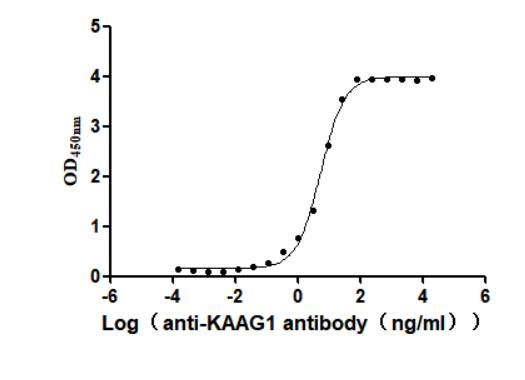Recombinant Mouse H-2 class II histocompatibility antigen gamma chain (Cd74), partial
-
货号:CSB-YP004956MO
-
规格:
-
来源:Yeast
-
其他:
-
货号:CSB-EP004956MO-B
-
规格:
-
来源:E.coli
-
共轭:Avi-tag Biotinylated
E. coli biotin ligase (BirA) is highly specific in covalently attaching biotin to the 15 amino acid AviTag peptide. This recombinant protein was biotinylated in vivo by AviTag-BirA technology, which method is BriA catalyzes amide linkage between the biotin and the specific lysine of the AviTag.
-
其他:
-
货号:CSB-BP004956MO
-
规格:
-
来源:Baculovirus
-
其他:
-
货号:CSB-MP004956MO
-
规格:
-
来源:Mammalian cell
-
其他:
产品详情
-
纯度:>85% (SDS-PAGE)
-
基因名:
-
Uniprot No.:
-
别名:Cd74; Ii; H-2 class II histocompatibility antigen gamma chain; Ia antigen-associated invariant chain; Ii; MHC class II-associated invariant chain; CD antigen CD74) [Cleaved into: Class-II-associated invariant chain peptide; CLIP)]
-
种属:Mus musculus (Mouse)
-
蛋白长度:Partial
-
蛋白标签:Tag type will be determined during the manufacturing process.
The tag type will be determined during production process. If you have specified tag type, please tell us and we will develop the specified tag preferentially. -
产品提供形式:Lyophilized powder
Note: We will preferentially ship the format that we have in stock, however, if you have any special requirement for the format, please remark your requirement when placing the order, we will prepare according to your demand. -
复溶:We recommend that this vial be briefly centrifuged prior to opening to bring the contents to the bottom. Please reconstitute protein in deionized sterile water to a concentration of 0.1-1.0 mg/mL.We recommend to add 5-50% of glycerol (final concentration) and aliquot for long-term storage at -20℃/-80℃. Our default final concentration of glycerol is 50%. Customers could use it as reference.
-
储存条件:Store at -20°C/-80°C upon receipt, aliquoting is necessary for mutiple use. Avoid repeated freeze-thaw cycles.
-
保质期:The shelf life is related to many factors, storage state, buffer ingredients, storage temperature and the stability of the protein itself.
Generally, the shelf life of liquid form is 6 months at -20°C/-80°C. The shelf life of lyophilized form is 12 months at -20°C/-80°C. -
货期:Delivery time may differ from different purchasing way or location, please kindly consult your local distributors for specific delivery time.Note: All of our proteins are default shipped with normal blue ice packs, if you request to ship with dry ice, please communicate with us in advance and extra fees will be charged.
-
注意事项:Repeated freezing and thawing is not recommended. Store working aliquots at 4°C for up to one week.
-
Datasheet :Please contact us to get it.
相关产品
靶点详情
-
功能:Plays a critical role in MHC class II antigen processing by stabilizing peptide-free class II alpha/beta heterodimers in a complex soon after their synthesis and directing transport of the complex from the endoplasmic reticulum to compartments where peptide loading of class II takes place. Enhance also the stimulation of T-cell responses through interaction with CD44.; Stabilizes the conformation of mature CTSL by binding to its active site and serving as a chaperone to help maintain a pool of mature enzyme in endocytic compartments and extracel...显示更多
-
基因功能参考文献:
- House dust mites sensitization lowered humoral immune responses to intact pneumococcus and this effect was significantly modified by the HLA-DR polymorphism. PMID: 27506953
- Data highlight the complexity of the MIF/CD74 signaling pathway in the development of mesothelioma. PMID: 26883190
- We demonstrate that MHCII is dispensable for the B cell phenotype of (signal peptide peptidase-like 2a) SPPL2a(-/-) mice, further supporting a CD74-intrinsic effect. PMID: 28550201
- CLIP expression and activated gamma-delta T cells are responsible for the development of preeclampsia. PMID: 28642294
- MIF-CD74 signaling inhibits interferon (IFN)-gamma secretion in microglia through phosphorylation of microglial ERK1/2 (extracellular signal-regulated protein kinases 1 and 2). The inhibition of MIF signaling or its receptor CD74 promotes IFN-gamma release and amplifies tumor death either through pharmacological inhibition or through siRNA-mediated knockdown. PMID: 27157615
- Ii mediated pathways play a vital role in the initiation and propagation of liver inflammation. PMID: 27371158
- CD74-knockout mice showed disturbed placental morphology, reduced junctional zone, smaller placentas, and impaired spiral artery remodeling with fetal growth restriction. PMID: 27199465
- explored CD74 expression, which can form a complex with CD44, in glomerular parietal epithelial cells during the progression of a model of focal segmental glomerulosclerosis PMID: 27463800
- might play roles in both the middle ear and inner ear in lipopolysaccharide-induced otitis media PMID: 27181906
- Data show that cathepsins S (CatS) regulates CCL2 chemokine expression by modulation of CD74 antigen processing. PMID: 26358505
- Suggest that the DQA1*0103/CD74 dimer may result in presentation of unique antigens and susceptibility to develop arthritis. PMID: 26524976
- CD74 plays a critical role in the MIF inhibition of osteoclastogenesis. PMID: 23044992
- Genetic deletion of CD74 restored the ability of infected dendritic cells to present a parasite antigen in the context of MHC-II. PMID: 26195549
- SPPL2a-mediated processing of CD74 NTF is indispensable to maintain appropriate levels of tonic BCR signaling to promote B cell maturation. PMID: 26157172
- Results support the hypothesis that neurodegeneration following traumatic brain injury is dependent upon antigen processing and presentation that requires CD74 PMID: 25329434
- Methylglyoxal induced gene expression of CD74 in the in the diabetic retina. PMID: 24974304
- In TPA-induced skin inflammation, MIF is released from damaged keratinocytes and then triggers the chemotaxis of CD74(+)CXCR2(+) NKT cells for IFN-gamma production. PMID: 25172501
- MIF promotes the migration of B cells through a ZAP-70-dependent pathway mediated by cooperative engagement of CXCR4 and CD74. PMID: 24760155
- These results demonstrate natural antagonist activity of DRalpha1 for macrophage migration inhibitory factor PMID: 24683185
- Recombinant vaccinia virus vaccines encoding CD74 may be useful tools to improve CD4 T-cell responses to viral and tumour antigens. PMID: 24205828
- Macrophage migration inhibitory factor receptor CD74 mediates alphavirus-induced arthritis and myositis in murine models of alphavirus infection. PMID: 23896945
- These findings implicate binding of recombinant T-cell receptor ligand constructs to CD74 as a key step in both antigen-driven and bystander T-cell tolerance important in treatment of inflammatory diseases. PMID: 23026773
- Data show that human Iip35 isoform (CD74 antigen) is expressed in mouse antigen presenting cells. PMID: 22689013
- regulation of CD74 levels by SPPL2a is indispensable for B cell development PMID: 23267015
- ). Proteolytic processing of CD74 requires SPPL2A. PMID: 23267016
- These results emphasize the importance of Ii in B cell homeostasis and suggest that Iip35 could have regulatory functions. PMID: 22966065
- demonstrate here a CD74-dependent MHC class I cross-presentation pathway in dendritic cells that had a major role in the generation of MHC class I-restricted, cytolytic T lymphocyte responses to viral protein- and cell-associated antigens PMID: 22306692
- The cytokine midkine and its receptor RPTPzeta regulate B cell survival in a pathway induced by CD74. PMID: 22140262
- MIF promoted the phosphorylation of AMP-activated protein kinase (AMPK) in a CD74-dependent manner and, in turn, inhibition of AMPK reversed the inhibition of PDGF-induced hepatic stellate cell activation by MIF. PMID: 21969590
- iNKT developed in Ii(-/-) but not catS(-/-) mice have defective effector function. PMID: 21565221
- Data demonstrate that MIF and CD74 play previously unappreciated roles in CCL2-induced macrophage adhesion and migration. PMID: 21411731
- this study emphasizes the role of microvesicles and Ii in the communication between DC and microglia. PMID: 20816669
- although other regions of Ii interact with class II, CLIP binding to the groove is likely to be a dominant event in assembly of nascent class II molecules with Ii in the ER PMID: 20547545
- expression and function of CD74 in normal colon epithelial cells and colon carcinoma cells PMID: 20614481
- Data show that D74-HGF/c-Met axis defines a novel physiologic survival pathway in mature B cells, resulting in the control of the humoral immune response. PMID: 20639480
- We here identify Cd74 as a common insertion site in murine B-lymphomas PMID: 20416035
- Preferential Th1 immune response in invariant chain knockout mice PMID: 11823488
- structure for the trimeric MHC class II-associated invariant chain transmembrane domain PMID: 12126629
- Expression and function of transgenic HLA-DQ molecules and lymphocyte development in mice lacking invariant chain. PMID: 12165499
- major histocompatibility complex class II-associated invariant chain controls the activity of extracellular cathepsin L PMID: 12417635
- Ii and its isoforms are essential to mediate ovalbumin-induced pulmonary inflammation, IgE generation, and airway hyperresponsiveness in a Th2-dependent immune response. PMID: 12538710
- Expression of Ii blocks constitutive major histocompatibility (MHC) class II localization to plasma membrane lipid rafts and may reduce vaccine efficiency of M12.C3 B cell lymphoma and SaI-Ak sarcoma tumor vaccine cells. PMID: 14707062
- Ii deficiency induces cell autonomous defects of two distinct B cell lineages: the life span of mature follicular B cells is reduced, accounting for their markedly decreased frequency, whereas, in contrast, marginal zone B cells accumulate. PMID: 14764672
- In p41 CD74 isoform-transgenic mice on an I-A(d) background (p41-I-A(d) mice), the recovery from CNS injuries was worse than that of controls. PMID: 17182551
- Ii siRNA-transfected H-2(K) DCs enhanced Th1 responses. PMID: 17296316
- These results suggest that invariant chain-chondroitin sulfate may play an important role in the generation of cell-surface pools of invariant chain that can serve as receptors for CD44 and macrophage migration inhibitory factor. PMID: 17492940
- Ii-Key modified HER-2/neu776-790 hybrid peptides are sufficiently potent to provide antigen-specific CD4+ TH cells with therapeutic antitumor activity PMID: 17634957
- the CD74/NF-kappaB/TAp63 axis defines a novel antiapoptotic pathway in mature B cells, resulting in the shaping of both the B-cell repertoire and the immune response PMID: 17846227
- impact of allelic variation in CLIP affinity on immune responses will be highest in cells with limited DM activity PMID: 17947664
- NOS2 interacts with CD74 (the MHC II-associated invariant chain), and the degradation of CD74 by caspases in immature dendritic cells was inhibited upon treatment with nitric oxide donor. PMID: 18003616
收起更多
-
亚细胞定位:[Isoform Long]: Late endosome. Lysosome.; Cell membrane; Single-pass type II membrane protein. Endoplasmic reticulum membrane. Golgi apparatus, trans-Golgi network. Endosome. Lysosome.
-
组织特异性:[Isoform Long]: Expressed in thymus and lymph noodes. Expressed by antigen-presenting cells (APCs).; [Isoform Short]: Expressed in thymus and lymph noodes.
-
数据库链接:
KEGG: mmu:16149
STRING: 10090.ENSMUSP00000095171
UniGene: Mm.439737


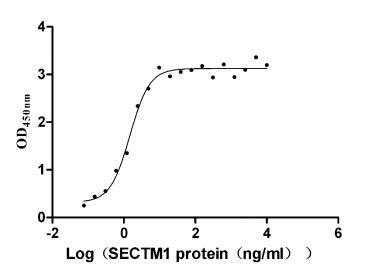
-AC1.jpg)
